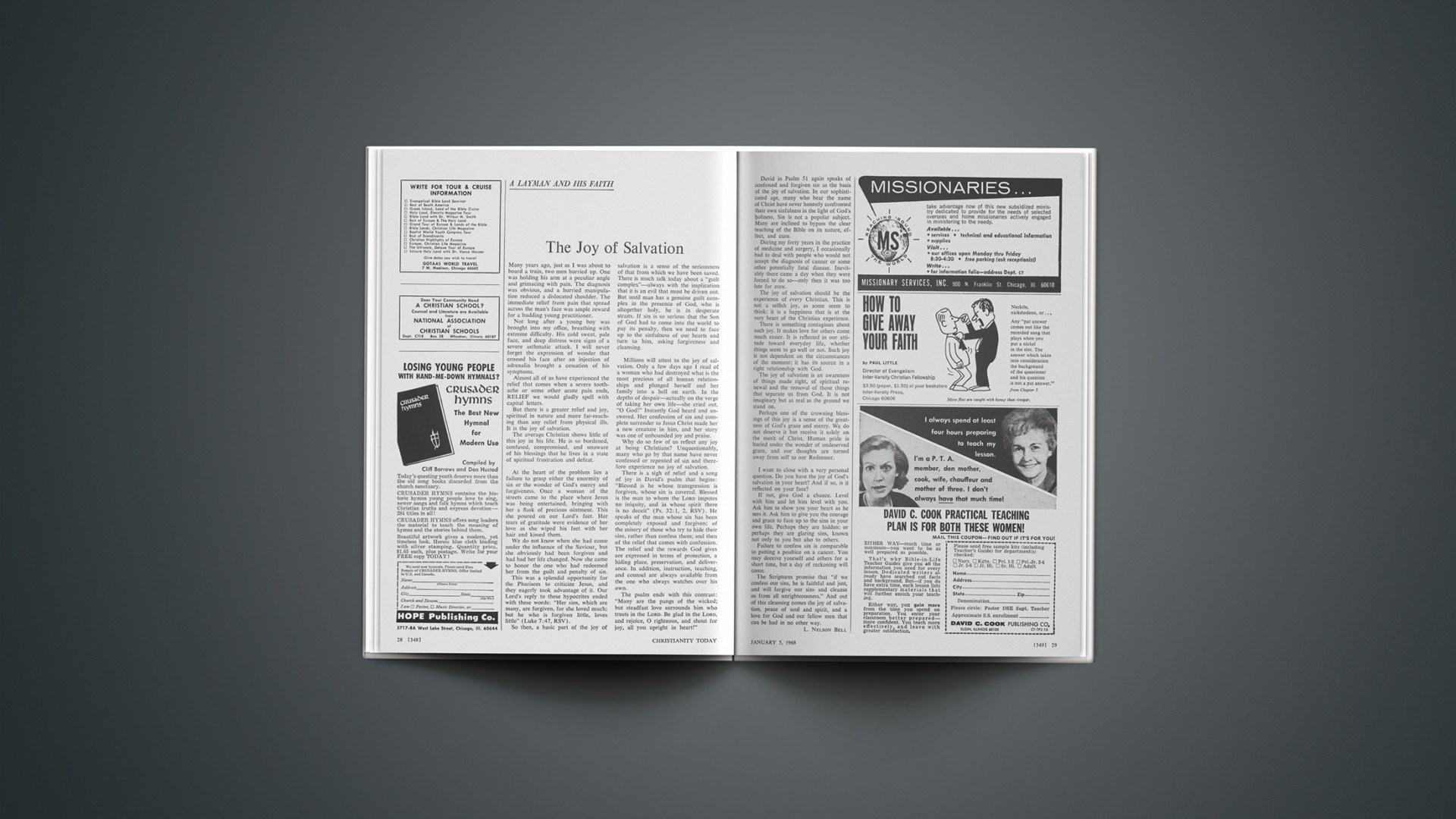Many years ago, just as I was about to board a train, two men hurried up. One was holding his arm at a peculiar angle and grimacing with pain. The diagnosis was obvious, and a hurried manipulation reduced a dislocated shoulder. The immediate relief from pain that spread across the man’s face was ample reward for a budding young practitioner.
Not long after a young boy was brought into my office, breathing with extreme difficulty. His cold sweat, pale face, and deep distress were signs of a severe asthmatic attack. I will never forget the expression of wonder that crossed his face after an injection of adrenalin brought a cessation of his symptoms.
Almost all of us have experienced the relief that comes when a severe toothache or some other acute pain ends, RELIEF we would gladly spell with capital letters.
But there is a greater relief and joy, spiritual in nature and more far-reaching than any relief from physical ills. It is the joy of salvation.
The average Christian shows little of this joy in his life. He is so burdened, confused, compromised, and unaware of his blessings that he lives in a state of spiritual frustration and defeat.
At the heart of the problem lies a failure to grasp either the enormity of sin or the wonder of God’s mercy and forgiveness. Once a woman of the streets came to the place where Jesus was being entertained, bringing with her a flask of precious ointment. This she poured on our Lord’s feet. Her tears of gratitude were evidence of her love as she wiped his feet with her hair and kissed them.
We do not know when she had come under the influence of the Saviour, but she obviously had been forgiven and had had her life changed. Now she came to honor the one who had redeemed her from the guilt and penalty of sin.
This was a splendid opportunity for the Pharisees to criticize Jesus, and they eagerly took advantage of it. Our Lord’s reply to these hypocrites ended with these words: “Her sins, which are many, are forgiven, for she loved much; but he who is forgiven little, loves little” (Luke 7:47, RSV).
So then, a basic part of the joy of salvation is a sense of the seriousness of that from which we have been saved. There is much talk today about a “guilt complex”—always with the implication that it is an evil that must be driven out. But until man has a genuine guilt complex in the presence of God, who is altogether holy, he is in desperate straits. If sin is so serious that the Son of God had to come into the world to pay its penalty, then we need to face up to the sinfulness of our hearts and turn to him, asking forgiveness and cleansing.
Millions will attest to the joy of salvation. Only a few days ago I read of a woman who had destroyed what is the most precious of all human relationships and plunged herself and her family into a hell on earth. In the depths of despair—actually on the verge of taking her own life—she cried out, “O God!” Instantly God heard and answered. Her confession of sin and complete surrender to Jesus Christ made her a new creature in him, and her story was one of unbounded joy and praise.
Why do so few of us reflect any joy at being Christians? Unquestionably, many who go by that name have never confessed or repented of sin and therefore experience no joy of salvation.
There is a sigh of relief and a song of joy in David’s psalm that begins: “Blessed is he whose transgression is forgiven, whose sin is covered. Blessed is the man to whom the LORD imputes no iniquity, and in whose spirit there is no deceit” (Ps. 32:1, 2, RSV). He speaks of the man whose sin has been completely exposed and forgiven; of the misery of those who try to hide their sins, rather than confess them; and then of the relief that comes with confession. The relief and the rewards God gives are expressed in terms of protection, a hiding place, preservation, and deliverance. In addition, instruction, teaching, and counsel are always available from the one who always watches over his own.
The psalm ends with this contrast: “Many are the pangs of the wicked; but steadfast love surrounds him who trusts in the LORD. Be glad in the LORD, and rejoice, O righteous, and shout for joy, all you upright in heart!”
David in Psalm 51 again speaks of confessed and forgiven sin as the basis of the joy of salvation. In our sophisticated age, many who bear the name of Christ have never honestly confronted their own sinfulness in the light of God’s holiness. Sin is not a popular subject. Many are inclined to bypass the clear teaching of the Bible on its nature, effect, and cure.
During my forty years in the practice of medicine and surgery, I occasionally had to deal with people who would not accept the diagnosis of cancer or some other potentially fatal disease. Inevitably there came a day when they were forced to do so—only then it was too late for cure.
The joy of salvation should be the experience of every Christian. This is not a selfish joy, as some seem to think; it is a happiness that is at the very heart of the Christian experience.
There is something contagious about such joy. It makes love for others come much easier. It is reflected in our attitude toward everyday life, whether things seem to go well or not. Such joy is not dependent on the circumstances of the moment; it has its source in a right relationship with God.
The joy of salvation is an awareness of things made right, of spiritual renewal and the removal of those things that separate us from God. It is not imaginary but as real as the ground we stand on.
Perhaps one of the crowning blessings of this joy is a sense of the greatness of God’s grace and mercy. We do not deserve it but receive it solely on the merit of Christ. Human pride is buried under the wonder of undeserved grace, and our thoughts are turned away from self to our Redeemer.
I want to close with a very personal question. Do you have the joy of God’s salvation in your heart? And if so, is it reflected on your face?
If not, give God a chance. Level with him and let him level with you. Ask him to show you your heart as he sees it. Ask him to give you the courage and grace to face up to the sins in your own life. Perhaps they are hidden; or perhaps they are glaring sins, known not only to you but also to others.
Failure to confess sin is comparable to putting a poultice on a cancer. You may deceive yourself and others for a short time, but a day of reckoning will come.
The Scriptures promise that “if we confess our sins, he is faithful and just, and will forgive our sins and cleanse us from all unrighteousness.” And out of this cleansing comes the joy of salvation, peace of soul and spirit, and a love for God and our fellow men that can be had in no other way.










